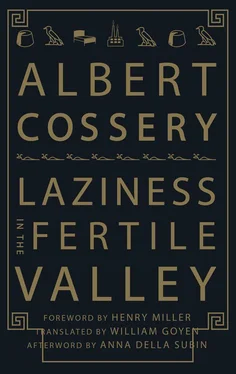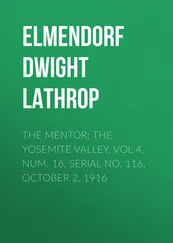Albert Cossery - Laziness in the Fertile Valley
Здесь есть возможность читать онлайн «Albert Cossery - Laziness in the Fertile Valley» весь текст электронной книги совершенно бесплатно (целиком полную версию без сокращений). В некоторых случаях можно слушать аудио, скачать через торрент в формате fb2 и присутствует краткое содержание. Год выпуска: 2013, Издательство: New Directions Publishing Corporation, Жанр: Современная проза, на английском языке. Описание произведения, (предисловие) а так же отзывы посетителей доступны на портале библиотеки ЛибКат.
- Название:Laziness in the Fertile Valley
- Автор:
- Издательство:New Directions Publishing Corporation
- Жанр:
- Год:2013
- ISBN:нет данных
- Рейтинг книги:3 / 5. Голосов: 1
-
Избранное:Добавить в избранное
- Отзывы:
-
Ваша оценка:
- 60
- 1
- 2
- 3
- 4
- 5
Laziness in the Fertile Valley: краткое содержание, описание и аннотация
Предлагаем к чтению аннотацию, описание, краткое содержание или предисловие (зависит от того, что написал сам автор книги «Laziness in the Fertile Valley»). Если вы не нашли необходимую информацию о книге — напишите в комментариях, мы постараемся отыскать её.
Laziness in the Fertile Valley — читать онлайн бесплатно полную книгу (весь текст) целиком
Ниже представлен текст книги, разбитый по страницам. Система сохранения места последней прочитанной страницы, позволяет с удобством читать онлайн бесплатно книгу «Laziness in the Fertile Valley», без необходимости каждый раз заново искать на чём Вы остановились. Поставьте закладку, и сможете в любой момент перейти на страницу, на которой закончили чтение.
Интервал:
Закладка:
He put out a trembling hand and tested the swollen, hard skin with extreme circumspection. Then he began to massage the edges slowly and expertly. Old Hafez watched hopefully to see this stubborn swelling between his legs grow smaller, but it seemed, on the contrary, to enlarge under his hand. It was ridiculous, insane. After some minutes, he gave up his treatment, pulled up the covers, and began to call for Hoda. No one answered. He took a package of cigarettes from under his pillow, drew one out and lit it. Then he called again. This time, he heard Hoda running up the stairs.
“You don’t listen when I call you!”
Hoda was panting slightly; she was always afraid when she entered the old man’s room. She felt physically ill and wanted to vomit.
“I came up right away,” she said.
She lowered her head humbly; her hair was hidden under a scarlet kerchief, bordered with tiny white shells. She watched the old man furtively, waiting for his orders. Sometimes he was completely unreasonable. Most of all, she feared he would make her look at his hernia. Old Hafez frequently showed it to her, simply to watch her reaction. Hoda’s obstinate silence usually comforted him, but today it didn’t help; he tossed in his bed and groaned:
“Open the window!”
Hoda went to the window and opened it. The rude light invaded the room, and the objects resumed the look of dead things. It was a large room, filled with heavy furniture, tarnished and dusty. Old Hafez felt drowned by this profusion of light; he blinked his eyes and turned to the wall.
“Tell me, girl! Hasn’t Haga Zohra come yet?”
“No,” said Hoda. “Not yet.”
“Are you sure?”
“I’m sure,” said Hoda. “I haven’t seen her.”
He rolled over and squinted at her.
“You’re lying, daughter of a bitch! I know my children told you not to let her come up.”
“That’s not true,” said Hoda. “No one has told me anything. I’ll bring her up when she comes.”
“Listen to me, you little ingrate! Don’t forget that I’m the master in this house. You take orders from me alone.”
“Yes, master,” said Hoda, “I do what you tell me.”
“If you don’t, I’ll throw you out of here. I only keep you out of pity for your mother. Don’t try to fool me. As for the children, I can take care of them, even if I don’t see them very often.”
He moved his hand over his chin, feeling the stiff hairs of his beard.
“And now, get ready to shave me.”
Hoda disappeared and came back with a basin of water, putting it on the table. Old Hafez got out of bed, and walked tremulously toward the rocking chair near the window. He was incredibly thin; his nightgown flapped around him. He walked bent over, his legs crooked, weighted down by his hernia. He dropped into the chair, threw back his head, and waited. Hoda began to soap his face. He closed his eyes with satisfaction. He felt a voluptuous pleasure at this freshness on his skin. He had a face of acute angles, cut by an abundant moustache, with edges yellowed by tobacco smoke. It sickened Hoda to touch this decaying, old man’s skin. His breath stank, and Hoda, afraid of fainting, strained not to come too close to him.
“What are the children doing?” he asked.
“They aren’t doing anything,” said Hoda. “They’re sleeping.”
“It’s all they know how to do,” said old Hafez. “By Allah! They’re beyond hope. Does Serag go out very much?”
“He’s been out once or twice,” said Hoda.
“That child is crazy! What’s he looking for outside?”
Old Hafez had a particular fondness for his youngest son. The boy seemed to him to possess a demon for adventure. He didn’t know how to steer him off his dangerous road. Old Hafez felt personally responsible for the difficulties that would not fail to overwhelm Serag if he persisted. He had created an existence of complete repose for him, and here he was, running out of the house with the diabolical idea of looking for work! Surely this generation was inconsiderate and frivolous. He thought he should have a serious talk with Serag. He would show him that his rash scheme was only an absurd and fruitless game. Old Hafez didn’t want one of his children to become a tramp on the streets. The honor of the family forbade it.
“You tell Serag I don’t want him to go out,” he said. “That child is going to be killed one of these days.”
“Yes, master,” said Hoda. “I’ll tell him.”
Hoda had finished shaving old Hafez when Uncle Mustapha came to see his brother. He lived on the same floor in an adjoining room.
“I’ve come to ask you for a cigarette,” he said with a forced smile.
“You and the children, you take all my cigarettes,” said old Hafez, groaning. “They’re on the bed, help yourself.”
Uncle Mustapha went up to the bed, took a cigarette and lit it. It was a very cheap tobacco, and Uncle Mustapha smoked it with weary distaste. He sighed and recalled the luxurious cigarettes he had smoked during his zenith.
“I beg you, stop sighing,” said old Hafez. “Why should you be so unhappy? Haven’t you everything you want?”
Old Hafez felt nothing but scorn for his brother Mustapha, who had squandered his part of their inheritance in a marriage with a disreputable woman. When, after the catastrophe, he had allowed Uncle Mustapha to come to the house, he had not made a gesture of brotherly pity. Rather, he had hoped to be able to humiliate him. Uncle Mustapha, not long before, had been extremely arrogant with old Hafez — the only one who had resisted him. He had never concealed the fact that he considered old Hafez a timorous bourgeois, miserly and mean. Old Hafez had never forgiven him for this insulting attitude. Now he avenged himself.
“I’d like to talk to you,” said old Hafez.
Uncle Mustapha was sitting on the edge of the bed. He smoked his cigarette with a terribly unhappy air.
“I’m listening,” he said.
“Well!” continued old Hafez. “You know about my decision to marry.”
“A happy decision,” said Uncle Mustapha. “It would be good to have a wife to take care of you. Allow me to congratulate you.”
“You can congratulate me later. Right now I want you to tell the children not to meddle in this affair. I suppose you’re not in league with them. That would really be shameless ingratitude.”
“Me!” said. Uncle Mustapha. “On the contrary, I’ve undertaken you defence. But I can’t do anything with Rafik. He’s capable of killing me.”
“That’s ridiculous! You’ve let yourself be frightened by a child! Rafik’s a bad boy, and that’s all. But I’ll teach him.”
“You’re right.”
“I’m always right. In any case, I’ll be married in spite of everything. I’ve told Haga Zohra to find me a young woman of a good family. There are plenty around here. I plan to marry as soon as possible.”
Uncle Mustapha didn’t answer. He knew his brother’s obstinacy and, above all, he remembered the story of the goat. It was a characteristic example of old Rafez’s bad faith and spirit of contradiction, One day when he was walking on his land with a cousin, old Hafez — who was then in his fiftieth year — stopped in the middle of a field and noticed a black form at the summit of a rise of ground. It was rather far away, and neither he nor his cousin could make it out clearly enough to say exactly what it was. “It’s a goat,” old Hafez said at once. “It’s a kite,” replied his cousin. Old Hafez told him he was blind and persisted in his own idea. After a minute, as they were arguing, the object of dispute flew up in the air and lost itself on the horizon. “You see, it was a kite,” cried the cousin, triumphant. Old Hafez retorted, not the least disturbed; “It was a goat, even if it flew away.” Before such aberration, the cousin went away, indignant, and stayed angry with old Hafez for a long time.
Читать дальшеИнтервал:
Закладка:
Похожие книги на «Laziness in the Fertile Valley»
Представляем Вашему вниманию похожие книги на «Laziness in the Fertile Valley» списком для выбора. Мы отобрали схожую по названию и смыслу литературу в надежде предоставить читателям больше вариантов отыскать новые, интересные, ещё непрочитанные произведения.
Обсуждение, отзывы о книге «Laziness in the Fertile Valley» и просто собственные мнения читателей. Оставьте ваши комментарии, напишите, что Вы думаете о произведении, его смысле или главных героях. Укажите что конкретно понравилось, а что нет, и почему Вы так считаете.












